SITE GUIDE
SEARCH
REVIEWS
FEATURES
NEWS
Etcetera and
Short Term Listings
LISTINGS
Broadway
Off-Broadway
NYC Restaurants
BOOKS and CDs
OTHER PLACES
Berkshires
London
California
New Jersey
DC
Philadelphia
Elsewhere
QUOTES
TKTS
PLAYWRIGHTS' ALBUMS
LETTERS TO EDITOR
FILM
LINKS
MISCELLANEOUS
Free Updates
Masthead
Writing for Us
CurtainUp Reviews
The Berkshire Theatre Festival's Summer 2007 Season
By Elyse Sommer
Last Updated: August 24, 2007Shows Reviewed to date:
Educating Rita -Note Xtra Labor Day Matinee
Mrs. Warren's Profession
Mornings At Seven
Two-Headed
One Flew Over the Cukoo's Nest
Love! Valour! Compassion!
The Glass Menagerie
About this All-In-One Format: Since summer theater productions run such a short time, we've decided to try something new this summer. Instead of retiring each show after it makes way for the next production, we're putting details and reviews of shows at a particular theater on one page so that everything remains at your fingertips. No need to click to the archives unless you are looking for something from a past season.
The list is organized in order scheduled. A list of Berkshire Main Stage Productions is followed by a list of productionss to be performed at the smaller Unicorn theater. A click on a show will jump you down to that show's details-- an * asterisk before a title indicates that a review is posted.
|
|
Stockbridge, MASS
413-298-5576
Shows To Be Covered
Click show title for basic details * added when review is posted
Main Stage Shows
Mon — Sat, 8pmThurs & Sat, 2pm
*Love! Valour! Compassion
June 19-21 to July 7, opening June 22.
*One Flew Over the Cuckoo's Nest
July 10 to July 28; opening July 13.
*Mornings At Seven
July 31 to August 11th, opening, August 3
*Mrs. Warren's Profession
August 14 to September 1, opening August 1
Unicorn Shows
Mon — Sat, 8pm Saturdays at 2pm
* The Glass Menagerie
May 24 to June 30th opening May 25.
*Two-Headed
July 25 to August 18; opening July 26
*Educating Rita
August 21 to October 20; opening August 22 (closed Aug.31 to Sept 28, then reopening)
An Extra Labor Day Performance has been added on Saturday, September 1 at 8pm.
Love! Valour! Compassion!
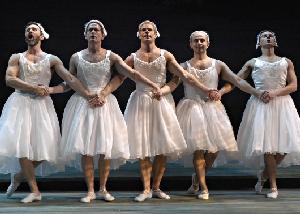
Romain Frugé, James Lloyd Reynolds, Matthew Wilkas, Stephen DeRosa, and Ricky Fromeyer in Berkshire Theatre Festival'sproduction of Love! Valour! Compassion!
(Photo: Kevin Sprague) |
|
You may wonder why I fill my head with such trivial-seeming information. First of all, it isn't trivial to me, and second, I can contain the world of the Broadway musical. Get my hands around it, so to speak. Be the master of one little universe. — Buzz, whose passion for collecting musical trivia and jokey show queen manner can't control the reality of his being H.I.V. positive.
|

Stephen DeRosa as Buzz Hauser in Love! Valour! Compassion! (To be reviewed shortly)
(Photo: Kevin Sprague) |
The title, taken from an entry in John Cheever's journals, pretty much spells out what it's about, even though the AIDS crisis, while far from past history, no longer has quite the triple exclamation point immediacy it did when the play premiered in 1995. Anyway. . . to borrow from the favorite lead-in to the monologues that furnish the three weekends with nuance and insights into the characters' lives. . . this is no more just about the scourge of AIDS than it is just for gays. Instead, it's McNally's spin on the country house party play (think G.B. Shaw and Oscar Wilde), chockfull of witty repartee, a group portrait of a particular circle of friends whose lives are intricately interconnected through their work for Gregory Mitchell, a well-known choreographer. The cloud of AIDS that overhangs the three summer weekends at Gregory's Dutchess County lakeside house and studio, addresses among other universal issues (aging, fidelity, propriety) the universal need to deal with death and dying.
After the disappointing Deuce written by Mr. McNally for Angela Lansbury and Marian Seldes, and his return to an all male cast in the the enjoyable but not top tier Some Men (Deuce review. . .Some Men review), it's good to have a chance to revisit the Tony Award winning Love!. . . While, a visit after another ten year hiatus might make it more dated, the current production under Anders Cato's sensitive direction, is remarkably free of even a whiff of been there, seen this. Hugh Landwehr's beautiful set is, if anything, even sparer and more suited to the tranquil yet restive mood than the original.
The play still exemplifies one of the most effective and affecting ever uses of audience addressing monologues to enrich and dramatize a play that gets its dramatic sparks from quiet moments of love, valor and compassion without explanation points. Even the unintended betrayal that affects the various relationships is more of a ripple than an explosion. As the joys and crises in our own lives are not punctuated by fireworks but daily events and interchanges, so the three weekends (Decoration Day, July 4th and Labor Day) that comprise the three acts cause all the characters to confront their demons and find the strength to move on whether moving on means Gregory's allowing a younger dancer to do what his tired legs can no longer do or, like Buzz and his new love, facing premature death.
Cato has put together a tightly knit, first-rate ensemble to create this portrait of friends as a family, with all of the complications of love and animosity that are part of all family relationships. The contributions of all are so strong that it's hard to talk about standouts. Still, since Nathan Lane as Bud Hauser, the needy show queen and Gregory's costume designer whom McNally gifted with most of his wittiest bon mots, was so sorely missed from the film version, it's a pleasure to report that Stephen DeRosa is good enough to banish all comparisons. DeRosa, who first came to my attention with his quick-change artistry in The Mystery of Irma Vep is one of those comics with flawless timing but he also knows how to get beneath the shtick and break your heart, as he does in the final act.
While De Rosa has the funniest role, David Atkins, a BTF favorite, has the showiest as John and James Jeckyll, two British twin brothers whose surname symbolizes their dual natures — John unloved and unloving, and James instantly lovable and loving. Atkins not only manages to stick to his British accent without a single slip, but proves himself more than up to the emotional demands of embodying these complex siblings. A not very successful writer of musicals, John now works as the rehearsal pianist for Gregory's dance company so he's conveniently playing the piano indoors when James is on stage, though in one brilliant scene he actually plays both brothers simultaneously.
Anyway. . .to borrow that word once again. . .the rest of the cast project all the quirks and emotions called for: Romain Frugé as the choreographer who must deal with career and personal losses. . . Jonathan Fried and James Lloyd Reynolds as the role model for imperfectly perfect long-term relationships. . . Matthew Wilkas as a somewhat flawed blind angel figure who can often see more than the sighted people around him. . . Ricky Fromeyer, who may not have quite the acting chops for the serpent entering Gregory's Eden-like retreat (as John Jekyll's lover), but certainly has the muscled good looks to fit the part.
Audiences who've become accustomed to ninety-minute intermissionless plays, will find the three hours with two intermissions a sticktoitiveness challenge and some tightning throughout is indeed in order but perhaps forbidden by the author. But, anyway. . .here I go again. . . the three hours go by faster than many a shorter play I've seen. Finally, if you've heard that there's nudity (common on New York stages but not in Berkshire summer theaters), there is . . .but like those tutus, it's all in good taste and of a piece with this still entertaining and moving play.
—Reviewed by Elyse Sommer on June 23rd. LOVE! VALOUR! COMPASSION!
Playwright: Terrence McNally
Director: Anders Cato
Cast: David Adkins (twin brothers John Jeckyll and James Jeckyll), Romain Frugé (Gregory Mitchell), Stephen DeRosa (Buzz Hauser), Jonathan Fried (Perry Sellars), James Lloyd Reynolds (Arthur Pape), Matthew Wilkas (Bobby Brahms), Ricky Fromeyer (Ramon Fornos).
Scenery: Hugh Landwehr
Costumes: Laurie Churba
Lighting:Jeff Davis
Composition & Sound: Scott Killian
Reviewed by Elyse Sommer on June 23rd
One Flew Over the Cuckoo's Nest
| The world belongs to the strong.—
Dale Harding
|

Randy Harrison & Jonathan Epstein in One Flew Over the Cukoo's Nest
(Photo: Kevin Sprague) |
Though the thematic messages are still relevant, the play seems to have not aged as well as we could have hoped. The current production at the Berkshire Theatre Festival seems to lack the vitality that could make such a predictable plot stun its audience with a deeper quality of interpretation.
Dale Wasserman, who also wrote the book for Man of La Mancha,”focuses on a small time criminal, Randle McMurphy, and his nemesis, Nurse Ratched. They immediately vie for power over the ward and each other. Ratched uses her authority to control the inmates, masking her hostility and vindictiveness with pseudo-psychological treatment; this serves to drive them into hopeless despair and deeper psychoses. The other patients slowly rally to McMurphy's carefree but rebellious attitude as he incites them to oppose Ratched and her demoralizing tactics. Soon the inmates are actually enjoying McMurphy's antics and the atmosphere on the ward undergoes a refreshing change. He realizes that Nurse Ratched enjoys baiting the men and belittling them in the group therapy sessions which have become a crippling game rather than a therapeutic process. . McMurphy's combative and independent spirit changes the tone of the sessions, the ward and the men's lives.
The play rehashes the formulaic clash where the downtrodden and insane are really the heroes and the rulers are the blind, decadent old order in need of change. Dr.Spivey is the beleaguered, ineffectual bureaucrat who leaves the ward in Ratched's administration rather than take her on and do his job.
The audience is involved with the actions of the various characters, but the only one who expresses his subjective impressions of the action swirling around him is the allegedly catatonic Chief Bromden. In a series of monologues directed to his dead father, he observes, using symbolic language, the hell of this white man's torture chamber, where mind-numbing drugs, isolation, electric shock, lobotomy and worse, boredom, are just a few of the barbarities practiced on the inmates. His pithy statements hint at the truth of this antiquated mental health system which in the 60's and 70's was lagging behind the other advances in technology and medicine. Bromden's statement "They're putting people in one end and out comes what they want," enigmatically suggests the end of the play.
Jonathan Epstein's McMurphy is defiant and strong as he attempts to thwart Ratched's absolute control of the ward. His McMurphy is a likeable rogue who is used to outsmarting the system with a wink and a smile. Ratched, played by Linda Hamilton, appears to be using the same calming drugs administered to her patients. Her zombie-like performance is almost a dial tone, which robs Epstein's McMurphy of the ability to escalate into the brutal battle which is brewing.
The secondary roles are a mixture of supporting and distracting. Randy Harrison's Billy Bibbit is especially touching as a young man dominated by his mother, abetted by Nurse Ratched. Tommy Schrider should be effete, but instead he is effeminate as Harding. Austin Durant's Bromden is effective though sometimes a little too ponderous. Jerry Krasser, E. Gray Simons III, Robert Serrell and Stew Nantell perform well as the other inmates.
Eric Hill's direction, like Epstein's performance, is muted by Hamilton's lack of malevolent subtext. Her prim and proper Sunday school teacher demeanor does not allow the production to reach its full potential. Rather it just sort of grounds to a halt as McMurphy comes to his already obvious end.
Karl Eigsti's set depicts a properly dingy institutional ward room, with run down mismatched furniture, as cast off as the inmates of the day room. Ratched's booth from which she oversees the space should dominate the center of the stage where she monitors her charges with an omniscient eye. The drama of her big brother presence is limited by the fact that the booth is set off to the side, where the entire audience cannot observe her constantly observing the men. Even the stage construction crimps the power that should emanate from such a spiteful force. The lighting design of Matthew E. Adelson casts effective shadows and utilizes various effects to accentuate Bromden's interior monologues.
This was a breakthrough piece of literature in the context of its time. Therefore, one should take the opportunity to experience it for, despite its shortcomings, there is much to be appreciated in this production.
—Reviewed by Gloria Miller.
Editor's Note: The play was last revived on Broadway with Gary Senise, see Review
|
ONE FLEW OVER THE CUCKOO'S NEST Written by Dale Wasserman, based on the novel of Ken Kesey Directed by Eric Hill Cast: Ron Bagden (Dr. Spivey), Sheldon Best (Aide Warren), Crystal Bock (Candy Starr), Austin Durant (Chief Bromden), Jonathan Epstein (Randle P. McMurphy), Linda Hamilton (Nurse Ratched), Randy Harrison (Billy Bibbit), Jerry Krasser (Scanlon), Stew Nantell (Ruckley), Tommy Schrider (Dale Harding), Robert Serrel (Martini)l, E. Gray Simons III Chetswick(), Anthony Mark Stockard (Aide Williams, Turkle), Rebecca Leigh Webber () Scenic Design: Karl Eigsti Costume Design: Jessica Risser-Milne Lighting Design: Matthew E. Adelson Running time: 2 ½ hours (one intermission) Berkshire Theatre Festival, POP Box 797, Stockbridge, MA, 413-298-5576; www.berkshiretheatre.org 7/10/07-7/28/07; opening 7/13/07 Mon-Sat at 8 pm; Thurs and Sat at 2 pm; tickets $45-$67 Reviewed by Gloria Miller based on July 13th performance |
Mornings At Seven
|
The year's at the spring, And day's at the morn: Morning's at seven; The snail's on the thorn; God's in His heaven All's right with the world. ---verse from "Pippa Passes" by Robert Browning from which Paul Osborn took the title for his seemingly idyllic picture of small town family life. |
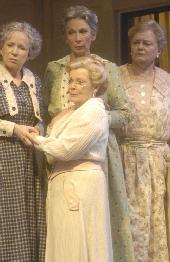
L to R: Debra Jo Rupp, Lucy Martin,Joyce Van Patten and (front) Anita Gillette, in Morning's at Seven.
(Photo by Kevin Sprague) |
Like one of Horton Foote's quiet, small town sagas, Morning at Seven isn't a great or neglected classic, yet it manages to charm you with its quiet picture of a no longer fashionable life style and its depiction of never out of fashion concerns: the fears and desperation that accompany aging and the ties that bind families together even when the ties are strained. With its light approach, Osborn's play feels like a precursor to the family sitcom, but the humor of these dysfunctional characters' interactions never drowns out the depth of their feelings.
In our youth-oriented culture, it's also gratifying to see a play that provides such wonderful roles for older actors. Like the Broadway revival I saw five years ago, Berkshire Theatre Festival has assembled a seasoned group of actors to make the Gibbs sisters and their loved ones step from the photo album-like script and come vividly alive. What's more, the director is Vivian Matalon who is credited for turning the play into a hit forty years after its disappointing Broadway premiere (it shuttered after only 44 performances despite the legendary Dorothy Gish as Aaronetta Gibbs). What Matalon did was to move the action further back from the threatening clouds of World War II and just before the Jazz Age and Great Depression that would impact even the uneventful dailiness of small town life. The 1922 time frame enhanced the dose of ditzy but endearing characters and made Matalon's 1980 revival a hit (564 performances) so that his revision became the standard for revivals of this gentle story.
You have to see that story to appreciate its warmth, but here's a thumbnail-sized summary of what it's about: A visit from sister Ida's (Debra Jo Rupp) 40-year-old son Homer Swanson (Kevin Carolan),with Myrtle Brown (Christianne Tisdale), his girl friend of many years. Everyone is pleased to finally meet Myrtle and with the likelihood of a wedding after which she and Homer will move into the house his father Carl Bolton, (Jonathan Hogan) a builder, has been keeping empty for him. But the happy event also brings on one of Carl's periodic spells of depression about having "taken a wrong turn" and becoming a builder instead of fulfilling his dream of being a dentist. This latest spell threatens Homer's release from Ida's apron strings and also raises issues about the empty house in which sister Cora (Lucy Martin) has a special interest for reasons of her own. That special interest in turn threatens her relationship with unmarried sister Arrie (Joyce Van Patten) who has lived with her and husband Theodore (Thor) Swanson (Paul Hecht) all their married lives.
Thus we have four sisters who have always lived within walking distance of each other —the oldest sister Esther (Anita Gillette) visiting the adjoining Swanson and Bolton homes despite her ex-professor husband David Crampton's (David Green) disdain for their their petty concerns. Only Carl, with his manic "spells" voices the darker undertones about the pain of aging and the wrong fork taken in life's road. But remember, this is a comedy, so rest assured that Carl's spells are as funny as they are sad and that the marital upsets stirred by Myrtle's visit and the obstacles to her joining the family circle will be resolved by the time the curtain falls.
Like the actresses I saw previously (Piper Laurie, Estelle Parson, Elizabeth Franz and Frances Sternhagen), the thespians on the Berkshire Festival Main Stage actually end up coming across as real sisters playing out their designated roles in the family structure. Joyce Van Patten as the unmarried Arrie and Anita Gilette as the oldest and most insightful are particularly good. The men are no second fiddles either, with Jonathan Logan's Carl especially touching.
Matalon has opted to emphasize the Grant Woods image that comes to mind when you first see Homer and Myrtle, by directing Kevin Carolan and Christianne Tisdale to play their roles in a highly stylized fashion. While this heightens the play's comic aspects and Carolan and Tisdale (a Swoozie Kurtz look-alike) are a riot, it is also probably the reason (besides using the old-fashioned, two intermission format) that this production has stretched into three hours. Much as I enjoyed seeing the play again and these performances, I don't think it warrants that length and would be as, if not more, enjoyable if two of the three acts were done without a pause and the total run time kept to a maximum of 2 1/2 hours.
David Murin has done his homework for the costumes (women did still wear floor length dresses in 1922 and men rately left their front porches without wearing a shirt and tie), but one can't help wishing he'd opted to make them just a bit less unbecoming. The production values overall are splendid. Michael Miller has created two clapboard houses as close to each other as the sisters living in them. Lighting designer Ann G. Wrightson has bathed this scene in a tranquil glow that belies the life and custom-changing events to come.
—Reviewed by Elyse Sommer.
|
Mornings at Seven Playwright: Paul Osborn Director: Vivian Matalon Cast: Kevin Carolan, Anita Gillette, David Green, Paul Hecht, Jonathan Hogan, Lucy Martin, Debra Jo Rupp, Joyce Van Patten, and Christianne Tisdale Scenic designer R. Michael Miller Costume designer: David Murin Lighting designer: Ann G. Wrightson Sound designer: Craig Kaufman. Reviewed by Elyse Sommer on August 4th |
Mrs. Warren's Profession
|
Do you think I did what I did because I liked it, or thought it right, or wouldn't rather have gone to college and been a lady if I'd had a chance?— Mrs. Warren. Everybody has some choice, mother. . .People are always blaming circumstances for what they are. I don't believe in circumstances. The people who get on in this world are the people who get up and look for the circumstances they want, and, if they can't find them, make them.—Vivie. This leads to her mother's detailing the circumstances (being overworked and underpaid) leading to her more profitable career. |
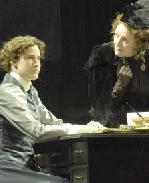
Xanthe Elbrick & Lisa Banes in Mrs. Warren's Profession
(Photo: Kevin Sprague) |
This inspired directorial fillip is typical of Mr. Cato's way with streamlining period plays while not only remaining true to the originals, but bringing out their continuing relevancy. Of course, there's only so much you can do to refresh a play if it's hopelessly dated, so Mr. Cato has wisely chosen works by playwrights of enduring quality. George Bernard Shaw generally, and this 1893 play in particular, certainly falls into that category. Yes, he's talky but that talk is always meaningful. It's his ability to cast a relentless eye on society's handling of complex moral issues abd do so with wit, humor, and memorable characters as his mouthpieces, is what sets his plays apart from one-note agitprop dramas. In Mrs. Warren's Profession he uses both the title character and her emancipated daughter to make a case for the sort of straight thinking, down-to-earth practicality that he championed as the basis for genuine humanism in all his plays.
The tragi-comic situation that brings Cambridge educated, highly moral Vivie Warren face to face with the fact that the fortune which has paid for her privileged upbringing was made in "the world's oldest profession" gives the sympathy edge to the mother who makes a solid case for its being the only career opportunity available to poor, uneducated women of the period. The daughter, bristling with youthful righteousness, is enough of a chip of the old block that one can easily envision her becoming less inflexible with age. Her dismissal of her mother's crass, crafty business partner, Sir George Crofts and her relationship with charming but exploitative Frank Gardner, is reminiscent of contemporary issues: women tempted by boy toys or willing to be trophy wives rather than work their way through the glass ceiling; and hypocrites in high places who fund good causes with ill-gotten fortunes.
Besides requiring an astute director, a successful revival of Shaw's work demands actors to deliver his ideas clearly (often in lengthy chunks of dialogue) and to be able to get inside characters who are real people full of idiosyncrasies. My last encounter with this play at the Irish Rep theater in New York, had such an outstanding cast that it was hard to imagine the play with a Kitty Warren other than Dana Ivey or a Vivie Warren other than Laura Odeh. But a play good enough to engage and entertain for over a century attracts expert performers, and the Berkshire Theatre Festival production boasts an excellent group of Shavians. Lisa Banes who early in the summer replaced the previously announced Jane Atkins and Xanthe Elbrick (last playing the title role in Coram Boy on Broadway) are effective as mother and daughter Warren. Banes, at first seems too slim and youtful to play the vulgar whore house madam but she makes the part her own. Elbrick slips right into the no-nonsense Vivie's persona. Both interact beautifully in their lengthy confrontational scenes.
Mark Nelson is terrific as Praed, the play's most lovable character and one of the few men Mrs. Warren's life who's always been just a friend. Walter Hudson is too old for Sir George Crofts' claim to being "not yet fifty." Since the play is in the public domain, the director could easily have changed that to age sixty. But no matter, Hudson is aptly lecherous and nasty.
Randy Harrison, who was so touching as Billy Bibbit in BTF's season opener, One Flew Over the Cukoo's Nest, is deliciously superficial as the playboy son of another character from Mrs. Warren's past — the Reverend Samuel Gardner, drolly played by Stephen Temperly.
Carl Sprague's simple, semi-abstract set is enriched by Dan Kotlowitz's lovely lighting. Olivera Gajic's period costumes are spot-on and Scott Killian's propulsive incidental music contributes to the effectiveness of those brief but inspired scene changing interludes. All in all, a commendable finale for the Mainstage season.
For more about George Bernard Shaw and links to other of his plays (including previous productions of Mrs. Warren's profession), see Curtainup's George Bernard Shaw Backgrounder.
—Reviewed by Elyse Sommer
|
Mrs. Warren's Profession
Playwright: George Bernard Shaw Director: Anders Cato Cast: Xanthe Elbrick (Vivie Warren), Lisa Banes (Mrs. Kitty Warren), Randy Harrison (Frank Gardner), Walter Hudson (Sir George Crofts), Mark Nelson (Praed), Stephen Temperley (ReverendSamuel Gardner). Sets: Carl Sprague Costumes: Olivera Gajic Lighting: Dan Kotlowitz Composition & Sound: Scott Killian Dialect Coach: David Alan Stern Reviewed by Elyse Sommer on August 18th. |
Second Stage (Unicorn) Shows
The Glass Menagerie
|
So what are we going to do with the rest of our lives? Stay home and watch the parade go by? Amuse ourselves with the glass menagerie, darling? Eternally play with worn-out phonograph records your father left as a painful reminder of him?— Amanda, in despair for the Wingfield family's future, after discovering that Laura has not been attending the business school she was enrolled in.
|
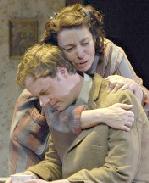
Tom Story and Kate Maguire in The Glass Menagerie.
(Photo: Kevin Sprague) |
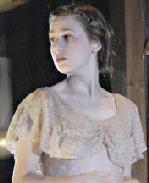
Aya Cash in The Glass Menagerie.
(Photo: Kevin Sprague) |
Southern belles and their gentlemen callers may have become dated cultural images but Williams' language has lost none of its eloquence and the Wingfields remain vibrant symbols of the unhappiness caused when parents try to break a pattern of disappointments and regain the best part of their youths though their children. Their painful struggle to survive difficult times —and each other— came right out of Williams' own unhappy family history.
The playwright's dominating mother supported his dreams of a writing career, but she was nevertheless the role model for Amanda Wingfield, the Southern Belle who, as a result of the 30s Depression and her poor choice of a mate from her "gentleman callers" ("the telephone man who fell in love with long distance. . .and skipped the light fantastic out of town"), is constantly anxious, scheming and in denial. Amanda's crippled daughter who's as emotionally fragile as the little glass animals she collects, was a fictionalized version of his own mentally ill sister. Tom, the family's chief support, would-be writer and the play's narrator, was of course the playwright's stand-in. Not to be overlooked is the fourth and most realistic character in what Tom-as-narrator introduces as "a memory play" — the "gentleman caller" he's badgered to bring home who serves as "an emissary from a world of reality that we were somehow set apart from."
In the more than sixty years that have passed since The Glass Menagerie established Williams as a great poet of the 20th century theater, it has brought many stellar Amandas, Lauras, Toms and Gentleman Callers to various stages. The actress playing Amanda, the role created by Laurette Taylor has generally been the one to get the most attention and there's been no shortage of distinguished names either on stage (Maureen Stapleton, Jessica Tandy , Julie Harris, Dana Ivey, Jessica Lange, Sally Field) or screen (Joanne Woodward, Katharine Hepburn, Gertrude Lawrence and Shirley Booth).
As some actors have put their distinctive stamp on the characters, so different directors have given their own interpretations of the playwright's extensive and beautifully written stage directions. Director Eric Hill has staged this Menagerie less as a starring vehicle for his wife and BTF Artistic Director Kate Maguire but as an ensemble piece.
For the most part Maguire is more steely, indomitable single mother than Blanche Dubois-like Southern belle. She scolds and she demands in the name of love and while she's the right age, it takes some doing to picture her as the flittery-gibbet, slim-waisted, peach complexioned Belle of Blue Mountain who was once awash in suitors or "gentlemen callers." That's not to say that as Laura escapes from harsh reality through her glass figures and Tom by going to the movies (code for gay bars and brothels), Amanda does not leave the harsh present for ruminations about her youth. And yet, when she actually dons a frilly gown saved from those glory days, she does manage to capture a sense of that sweet and carefree time.
In contrast to Maguire's interestingly earthy Amanda, Aya Cash is exquisitely ethereal as the socially inept Laura. She literally glows in the scene, when left alone with the Gentleman Caller (a likeable and astute portrayal by Greg Keller) you see her blossom just long enough to make you wish his kindness could give her more than a brief moment of a fully lived life. As for Tom (Tennessee Williams' name when still living with his family), Tom Story, who's no stranger to Unicorn productions, handles the narrator-participant's roles with just the right degree of wry, self-protective humor.
Hill's achievement, besides developing a strong ensemble, is to capture both the realism and dreamlike quality of this classic play. His mission is strongly supported by Carl Sprague's beautifully detailed set, Olivera Gajic's authentic '30s costumes, and resident composer and sound designer Scott Killian's atmospheric incidental music.
So many summer seasonal offerings run just a couple of weeks. Happily, Menagerie has been scheduled to give area residents and visitors until the end of June to catch this well worth seeing revival.
For more about Tennessee Williams, his life, work and links to production we've reviewed (including other productions of The Glass Menagerie, see our Tennesse Williams Backgrounder.
—Reviewed by Elyse Sommer on May 26th. THE GLASS MENAGERIE
Playwright: Tennessee Williams
Directed by Eric Hill.
Cast: Aya Cash (Laura), Greg Keller (Gentleman Caller), Kate Maguire (Amanda Wingfield), and Tom Story (Narrator/Tom Wingfield)
Scenery: Carl Sprague
Costume Design: Olivera Gajic
Lighting Design: Matthew E. Edelson
Composer and Sound Designer: Scott Killian
Two-Headed
| I wanted to see if I could write a two-person epic—Julie Jensen when asked what inspired her to write Two-Headed. Her explanation for the title: "When you have to keep a secret, it's as if you have two heads, one that can speak, and the other that cannot."
|
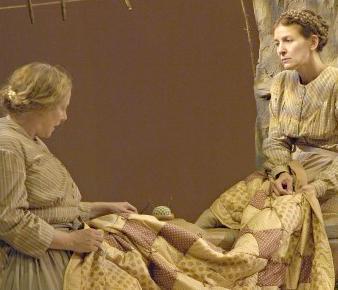
(L-R:) Diane Prusha & Corinna May in Two-Headed
(Photo: Kevin Sprague )
|
Jensen, who herself grew up in that part of the country, couldn't have chosen a more complex, multi-character story for her experiment with mini-scaled epic storytelling. This grisly slice of American history has all the makings of a Ken Burns multi-part docu-drama or a juicy film, yet it packs a big emotional wallop as filtered through two fictional women whose lives were dominated by both the massacre and the still active practice of polygamy. As I noted when I saw the Off-Broadway production seven years ago, her intimate perspective forced the audience to imagine what it was like to be a Mormon woman in the nineteenth century and thus understand how we all circumvent speaking freely about a lot of things. It transformed a historic event into the saga of a friendship pieced together like the patchwork quilts that often became frayed with use but were invariably patched together again.
We first meet Lavinia and Hettie whose forty-year friendship we witness in 1857 (just after the massacre), when both are ten years old. The consequent four scenes come a decade apart, ending in 1897. Having adults portray children is always tricky and not my favorite thing. But Corinna May and Diane Prusha are good enough actresses to overcome the difficulties of switching between child and adult characters. Perhaps because she's a big, mature looking woman, Prusha has a harder time with the ten-year-old persona than the slender, more physically agile Ms. May but both actresses make good use of that difficult first scene to establish the distinct personalities that establish the pattern of their life-long disagreements — and affection.
Lavinia clearly dominates the relationship. She's a smart, feisty and volatile personality and thus most certain to have the most difficulty with the two-headed metaphor that demands burying the facts about the massacre in silence and also accepting the realities of polygamy. As portrayed by May she is a seething cauldron of emotions. Prusha plays the less questioning and somewhat naive Hettie with admirable understatement but never to the point of uninvolving passivity.
Ms. Jensen's embrace of humor and sadness holds up beautifully in this production. Because nothing has changed since my last viewing I'll borrow from my original review to sum up the key people we get to know through Lavinia and Hettie:
Jane, the unseen third friend and much more a soul mate to Lavinia than Hettie. . . Ezra, Jane's husband and, after her death, when the women are twenty, Lavinia's husband. . . Lavinia's father, the zealot whose part in the massacre torments Lavinia, as does his taking Hettie as his second wife, leaving Lavinia feeling abandoned and enraged for her mother . . . Tess, Hettie and Ezra's daughter who becomes Ezra's second wife and has Lavinia, once more in a rage. . .and Lavinia's daughter Jane, who, unlike her mother and the woman for whom she was named, gets away from the hard scrabble farm life for a career as a midwife (as Lavinia and Jane once dreamed of careers as teachers).
The fact that none of these people actually appear on stage underscores the fact that, while the massacre and polygamy are playwright Jensen's dramatic building blocks, what ultimately moves us is the relationship of these two sometimes enemies but always friends. BTF's second stage is ideally suited for this intimately scaled epic and director Marc Geller has staged it so that these women's difficult lives play out with plenty of dramatic tension but none of melodrama inherent in the backstory. The move from one decade to the next is achieved without the often distracting between scene pauses and prop movements, with an assist from Daniel T. Denver's lovely incidental music.
A simple clothes line to accommodates changes of Dennis Ballard's period perfect costume changes is of a piece with Aaron P. Mastin's handsome wood and stone recreation of the exterior of a farm house. Mr. Mastin has addressed a problem I had with the production I previously saw. It too featured a large tree, but it was obviously a cardboard affair that did not allow the actors to climb it either to help establish Lavinia's restless spirit or for the final shedding of that silent second head. The tree on the Unicorn stage has a steel frame to support the actors and with a paint finish that makes it seem as real as any of the many trees that dot the Berkshires landscape.
As Two-Headed tells a large story with a cast of just two very fine actresses. That story is wisely told without a mood disrupting break. It ends exactly when it should, after just eighty minutes, but it will stay with you much longer.
To read Curtainup's review of the Off-Broadway production, go here.
Reviewed by Elyse Sommer at July 27th opening
| Two-Headed
Playwright:Julie Jensen Director: Marc Geller Cast: Corinna May as Lavinia, Diane Prusha as Hettie Sets: Aaron P. Mastin Costumes: Dennis Ballard Lighting Designer: Frank DenDanto III Composer: Daniel T. Denver Sound Designer: Craig Kaufman Running Time: Approximately 80 minutes without an intermission Reviewed by Elyse Sommer at July 27th opening night performance. |
Educating Rita
|
When d' y' actually, y' know, start teaching me?— Rita. What can I teach you?—Frank. Everything.—Rita |
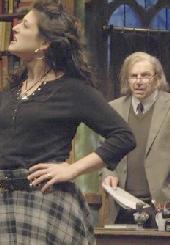
Tara Franklin & Jonathan Epstein
(Photo: Kevin Sprague)
|
You probably know Willy Russell's tinged with sadness comedy through the 1983 movie. It starred Michael Caine as the soured on life English professor and Julie Walters as the starved for knowledge young hair-dresser he agrees to tutor as part of an independent study program at a college in Northern England. He is not motivated by altruism, but a need for extra income to support his alcohol habit, but ends up learning as much as she does.
The BTF production is a rare opportunity to see the play as originally written by Russell, for two characters and confined to a single set. Two of this area's most interesting actors, Jonathan Epstein and Tara Franklin, demonstrate the power of live theater with finely nuanced performances—Epstein as Frank, the professor whose deadened emotional and creative spirit is revived by his ignorant but vibrantly alive student, and Franklin as thr student aptly described by Frank as "the ravishing Rita." Dialect coach David Alan Stern has helped her to achieve a Liverpuddian accent that's authentic enough to be understood even though it does get a bit too thick during some of her very long speeches
Epstein, who starred earlier this season as a strikingly red haired Randle McMurphy in One Flew Over the Cukoo's Nest, now sports an unflattering gray wig which, as Rita puts it, makes him look like"a geriatric hippiel." It's a much more subdued role that seems to make Franklin, heretofore more of a support player, the star. But while Franklin is an exuberant and endearing Rita, Epstein is amazingly effective in this subtle, wry portrait of a man whose slumbering intellectual and emotional senses are, at least briefly, stirred up. Just watch his expression as he takes in Rita's uninhibited, crude but sharp observations. There's no missing that the student he took on with little enthusiasm is going to be a lot more interesting than his "regular" students and make him in less of a hurry to hit the pub. Happily, wherever you sit in the Unicorn Theater, you're close enough to the stage, to catch every flicker of emotion on the actors' faces.
Even without seeing any of the people in Frank and Rita's lives as one did in the film, their deteriorating personal relationships are clarified from the very first tutoring session (his with his current lover, hers with the husband who objects to her educational ambitions and judy wants her to have a baby). The plot, in case you don't remember it, is simple enough — Frank helps Rita achieve her quest for intellectual and cultural development, and their shared love for literature and learning grows into a mutually comforting friendship. Conflict inevitably rears its head when Frank realizes that if he prepares Rita to pass the exams and become eligible to enroll as a regular student, she will lose some of the originality that he finds so refreshing (and that makes him more than a little regretful that she didn't walk into his office twenty years earlier). Rita does indeed change, making and enjoying new friends and a sense of belonging to a world she thought forever closed to her. While Frank's life continues on its downward trajectory, the bond between him and Rita is strong enough for a wonderfully touching (and funny) bittersweet ending.
Director Richard Corley propels the actors through the sixteen brief scenes at a well-paced tempo, energizing the more than a dozen blackouts with catchy pop tunes from the play's 80s era, with the then popular punk rock group The Clash, dominating the musical interludes. However, it's all those blackouts that make for the inevitable pitfall that come with the pleasure of seeing the story live with just two actors instead of opened up as in Russell's screenplay. Even the apt incidental music can't keep those blackouts during which stagehands handle minor prop rearrangements somewhat distracting and eventually annoying. Still, with Franklin making up for the single set with a veritable fashion show of outfits by costume designer Sarah Reever (she looks great in all), that annoyance is mitigated by anticipation about what new dress she'll show up in next.
Though there are only two people on stage, scenic designer Joseph Varga's book filled set is something of a third character. It is exactly the sort of room that prompts this awed compliment from Rita: "I'm going to have a room like this one day. There's nothing phoney about it. Everything's in the right place. It's a mess. But it'a a perfect mess. It's like wherever you've put something down it's grown to fit there."
The fact that both these actors hail from this area has the added benefit of enabling the Festival to bring Educating Rita back for the Leaf Season. So if you don't catch it before August 30th, you'll have a second chance to do so t when it reopens at the end of September.
—Reviewed by Elyse Sommer
9/27 Postscript: An extraxtra Labor Day peformance has been added on Saturday, September 1 at 8pm.
|
Educating Rita Playwright: Willy Russell. Director: Richard Corley Cast: Jonathan Epstein and Tara Franklin Scenic Design: Joseph Vargas Costumes: Sarah Reever Composer/Sound Designer: Joe Cerqua Lighting: Holly Bloomquist Dialect Coach: David Alan Stern From August 21 to August 30, reopening September 30th for one month. |
Wicked
Jersey Boys
The Little Mermaid
Lion King
Shrek The Musical

Easy-on-the budget super gift for yourself and your musical loving friends. Tons of gorgeous pictures.

Leonard Maltin's 2007 Movie Guide

At This Theater
Leonard Maltin's 2005 Movie Guide

 >
>

